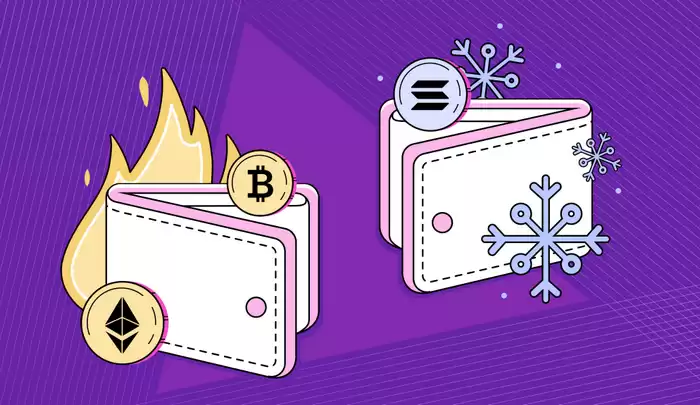-
 bitcoin
bitcoin $87959.907984 USD
1.34% -
 ethereum
ethereum $2920.497338 USD
3.04% -
 tether
tether $0.999775 USD
0.00% -
 xrp
xrp $2.237324 USD
8.12% -
 bnb
bnb $860.243768 USD
0.90% -
 solana
solana $138.089498 USD
5.43% -
 usd-coin
usd-coin $0.999807 USD
0.01% -
 tron
tron $0.272801 USD
-1.53% -
 dogecoin
dogecoin $0.150904 USD
2.96% -
 cardano
cardano $0.421635 USD
1.97% -
 hyperliquid
hyperliquid $32.152445 USD
2.23% -
 bitcoin-cash
bitcoin-cash $533.301069 USD
-1.94% -
 chainlink
chainlink $12.953417 USD
2.68% -
 unus-sed-leo
unus-sed-leo $9.535951 USD
0.73% -
 zcash
zcash $521.483386 USD
-2.87%
best cold crypto wallets
For ultimate digital asset security, opt for a cold crypto wallet like the Ledger Nano X, Trezor Model T, or SafePal S1, which provide immunity against hacking and malware due to their offline storage capabilities.
Oct 14, 2024 at 04:24 pm

Cold crypto wallets are hardware devices that store your cryptocurrency offline, making them immune to hacking attempts and malware attacks. They offer the highest level of security for your digital assets.
1. Ledger Nano X- Supports over 5,500 cryptocurrencies, including Bitcoin, Ethereum, and altcoins.
- OLED display for easy navigation and wallet management.
- Bluetooth connectivity for pairing with mobile devices for convenient transactions.
- Integrated battery for portable use.
- One of the oldest and most reputable cold wallets in the market.
- Features a large color touchscreen for enhanced user experience.
- Password manager with native 2FA support for additional security.
- Compatible with a wide range of cryptocurrencies.
- Lightweight and compact design, making it easy to carry and store.
- Supports over 10,000 cryptocurrencies and includes a dApp store for interacting with decentralized applications.
- IP68 water and dust resistant for durability.
- Bluetooth-enabled, credit card-sized hardware wallet with a curved e-ink display.
- Supports over 40 popular cryptocurrencies, including Bitcoin, Ethereum, and stablecoins.
- Integrates with the CoolBitX mobile app for easy transaction management.
- Advanced cold wallet with smart card-style design for maximum portability.
- 3-inch touchscreen and built-in fingerprint sensor for biometric security.
- Supports Bitcoin, Ethereum, and over 100 ERC-20 tokens.
- Consider the number of cryptocurrencies you want to store.
- Look for wallets with a user-friendly interface and robust security features.
- Check for device compatibility with your computer and/or mobile phone.
- Read reviews and research the reputation of the wallet manufacturer.
- Store your cold wallet in a secure location away from potential risks.
Disclaimer:info@kdj.com
The information provided is not trading advice. kdj.com does not assume any responsibility for any investments made based on the information provided in this article. Cryptocurrencies are highly volatile and it is highly recommended that you invest with caution after thorough research!
If you believe that the content used on this website infringes your copyright, please contact us immediately (info@kdj.com) and we will delete it promptly.
- Bitcoin's Four-Year Cycle: Navigating Drawdowns and the Road Ahead
- 2026-02-10 18:30:02
- Crypto Exchange Backpack Eyes Unicorn Status Amidst Token Launch and Quantum Defense Concerns
- 2026-02-10 18:40:02
- BNB Price Milestone: ICE Futures Launch Signals Institutional Interest Amid Price Predictions
- 2026-02-10 19:20:02
- Ethereum Foundation Teams Up with SEAL to Combat Crypto Drainers, AI Poised to Enhance Security
- 2026-02-10 19:20:02
- Bitcoin Holds Steady Amidst Quantum Quibbles and Market Swings: CoinShares Weighs In
- 2026-02-10 19:15:01
- Big Apple Beat: Delisting, Coin Stocks, and a Sweeping Market Reorganization
- 2026-02-10 18:40:02
Related knowledge

How to generate a new receiving address for Bitcoin privacy?
Jan 28,2026 at 01:00pm
Understanding Bitcoin Address Reuse Risks1. Reusing the same Bitcoin address across multiple transactions exposes transaction history to public blockc...

How to view transaction history on Etherscan via wallet link?
Jan 29,2026 at 02:40am
Accessing Wallet Transaction History1. Navigate to the official Etherscan website using a secure and updated web browser. 2. Locate the search bar pos...

How to restore a Trezor wallet on a new device?
Jan 28,2026 at 06:19am
Understanding the Recovery Process1. Trezor devices rely on a 12- or 24-word recovery seed generated during initial setup. This seed is the sole crypt...

How to delegate Tezos (XTZ) staking in Temple Wallet?
Jan 28,2026 at 11:00am
Accessing the Staking Interface1. Open the Temple Wallet browser extension or mobile application and ensure your wallet is unlocked. 2. Navigate to th...

How to set up a recurring buy on a non-custodial wallet?
Jan 28,2026 at 03:19pm
Understanding Non-Custodial Wallet Limitations1. Non-custodial wallets do not store private keys on centralized servers, meaning users retain full con...

How to protect your wallet from clipboard hijacking malware?
Jan 27,2026 at 10:39pm
Understanding Clipboard Hijacking in Cryptocurrency Wallets1. Clipboard hijacking malware monitors the system clipboard for cryptocurrency wallet addr...

How to generate a new receiving address for Bitcoin privacy?
Jan 28,2026 at 01:00pm
Understanding Bitcoin Address Reuse Risks1. Reusing the same Bitcoin address across multiple transactions exposes transaction history to public blockc...

How to view transaction history on Etherscan via wallet link?
Jan 29,2026 at 02:40am
Accessing Wallet Transaction History1. Navigate to the official Etherscan website using a secure and updated web browser. 2. Locate the search bar pos...

How to restore a Trezor wallet on a new device?
Jan 28,2026 at 06:19am
Understanding the Recovery Process1. Trezor devices rely on a 12- or 24-word recovery seed generated during initial setup. This seed is the sole crypt...

How to delegate Tezos (XTZ) staking in Temple Wallet?
Jan 28,2026 at 11:00am
Accessing the Staking Interface1. Open the Temple Wallet browser extension or mobile application and ensure your wallet is unlocked. 2. Navigate to th...

How to set up a recurring buy on a non-custodial wallet?
Jan 28,2026 at 03:19pm
Understanding Non-Custodial Wallet Limitations1. Non-custodial wallets do not store private keys on centralized servers, meaning users retain full con...

How to protect your wallet from clipboard hijacking malware?
Jan 27,2026 at 10:39pm
Understanding Clipboard Hijacking in Cryptocurrency Wallets1. Clipboard hijacking malware monitors the system clipboard for cryptocurrency wallet addr...
See all articles










































































